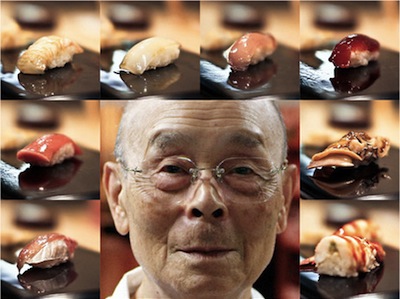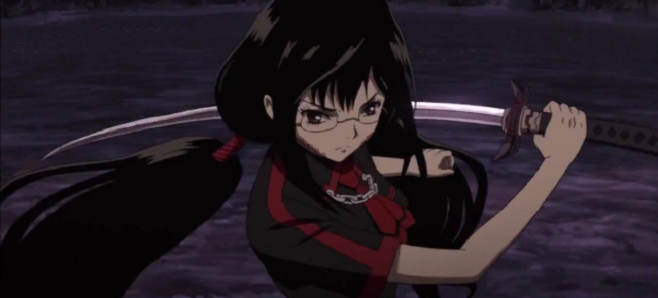Culinary Cost
When Jiro Ono appeared onscreen and began explaining his life philosophy, I found myself unexpectedly dazed.
“Once you decide on your occupation…you must immerse yourself in your work,” he says. “You have to fall in love with your work. Never complain about your job. You must dedicate your life to mastering your skill. That’s the secret of success…and is the key to being regarded honorably.”
Later, Ono smiles at the camera, continuing: “Nowadays, parents tell their children, ‘You can return if it doesn’t work out.’ When parents say stupid things like that, the kids turn out to be failures.”
[pullquote]I want Ono to express other desires. I want him to have other pastimes, to regret not being there as his children grew up without him – sons without a father, wife without a husband.[/pullquote]
Ono, an 85-year-old sushi chef set up in Tokyo’s Ginza district, is the subject of David Gelb’s debut documentary Jiro Dreams of Sushi. After becoming an apprentice at the age of nine when he discovered he “had no home to go back to,” Ono has been making sushi ever since. He works late. He never takes a day off. The only reason he stopped personally shopping for his restaurant’s seafood was because a heart attack blindsided him in the middle of Tsukiji fish market. When national holidays roll around, I imagine it must hurt him to stay home almost as much as that unfortunate trip to the hospital did.
Even while he sleeps, Ono says he dreams of raw fish and rice. This terrifies me.
Since I moved to South Korea two years ago, it hasn’t always been easy to find topics that the natives and I agree on. (Some recent silly disagreements: Korean women dominate Olympic archery because of chopsticks; fan death; and one coworker’s insistence that Japan is secretly implementing a strategy to re-occupy the Korean peninsula.) There is one statement, however, that never fails to round us up on the same side: Koreans work way too much.
 According to the Organization for Economic Cooperation and Development, every year people in Korea work nearly 450 hours more than the average for developed countries. Marriages are bent, if not broken. Fathers are never seen at school. Students have little to no social life. More than half of them go to private academies every day (and on weekends), sometimes until 10 pm, often studying more afterwards before passing out from exhaustion. And that’s just at the elementary school where I teach. Stress levels are so high that Korea is home to the highest suicide rate on the globe. In fact, suicide is the leading cause of death for people under 40.
According to the Organization for Economic Cooperation and Development, every year people in Korea work nearly 450 hours more than the average for developed countries. Marriages are bent, if not broken. Fathers are never seen at school. Students have little to no social life. More than half of them go to private academies every day (and on weekends), sometimes until 10 pm, often studying more afterwards before passing out from exhaustion. And that’s just at the elementary school where I teach. Stress levels are so high that Korea is home to the highest suicide rate on the globe. In fact, suicide is the leading cause of death for people under 40.
It’s within this context that I watched Jiro Dreams of Sushi, a reverent, romanticized love letter to work and those who plunge themselves headfirst into a lifestyle dedicated to a single craft. Many expats and Koreans talk so easily about the consequences of such slavish devotion to work that we’ve convinced ourselves the costs far outweigh the benefits. I didn’t quite know how to react once the credits rolled.
Although the film talks a great deal about dedication and hard labor, the work life is often portrayed as full of wonder, almost magical. Sweeping music is played as Ono melds rice and fish together and as his apprentices massage dead octopi in buckets for 45 minutes (up from Ono’s previously sanctioned half hour routine). The film gracefully seems to gloss over the difficult, tedious and sometimes maddening work it takes to produce.
 Maybe this bothered me because, despite the loving admiration that the film portrays him in, I can imagine the cost of Ono’s greatness. (I can only imagine, though, because the movie offers no glimpse into his life outside of sushi-making, should he have one. The distinct impression is that he does not).
Maybe this bothered me because, despite the loving admiration that the film portrays him in, I can imagine the cost of Ono’s greatness. (I can only imagine, though, because the movie offers no glimpse into his life outside of sushi-making, should he have one. The distinct impression is that he does not).
Another layer: halfway through the film, my girlfriend wondered if Ono’s wife had died. She is never seen and barely mentioned, except to contextualize Ono’s sushi obsession by noting she’d drive him out of the house if he spent more time there. How did they meet? What is their relationship like?
Clearly they had sons (Ono convinced both of them to skip college and apprentice under him as sushi chefs). Yoshikazu, 50 years old now, labors for him as he waits to take over the restaurant, while his younger brother, with his father’s blessing, opened up his own place. Though they both seem happy, Yoshikazu admits to being a speed freak and wanting to be a race car driver when he was younger. There is no sign that Ono ever has any regrets, or even moments of nostalgia. He briefly admits to being a bad father. What is his relationship with his sons like these days, outside of work?
 As much as one can love their job, doesn’t a life dedicated only to that feel a little hollow? I crave a relationship with my partner that involves us spending a lot of time together. I look forward to the prospect of my future children knowing me well. I enjoy lovingly wasting time on pointless things. But I also know that despite these feelings, despite being surrounded by Korea’s growing wariness of work, part of me can’t help but look at Ono with admiration. I’d like to excel at my craft, too.
As much as one can love their job, doesn’t a life dedicated only to that feel a little hollow? I crave a relationship with my partner that involves us spending a lot of time together. I look forward to the prospect of my future children knowing me well. I enjoy lovingly wasting time on pointless things. But I also know that despite these feelings, despite being surrounded by Korea’s growing wariness of work, part of me can’t help but look at Ono with admiration. I’d like to excel at my craft, too.
I want Ono to express other desires. I want him to have other pastimes, to regret not being there as his children grew up without him – sons without a father, wife without a husband – I almost need him to, so it can be clear that success can be had without a singularly maddening focus and work ethic. His submission to his craft both challenges and inspires my own dedication as I get ready to leave South Korea and move back to the United States. Unlike Ono’s family, though, mine is giving me a home to return to for a while. Here’s hoping that’s not a mistake.
———
Jordan Mammo probably doesn’t slave over tweets as much @jordanmammo.





